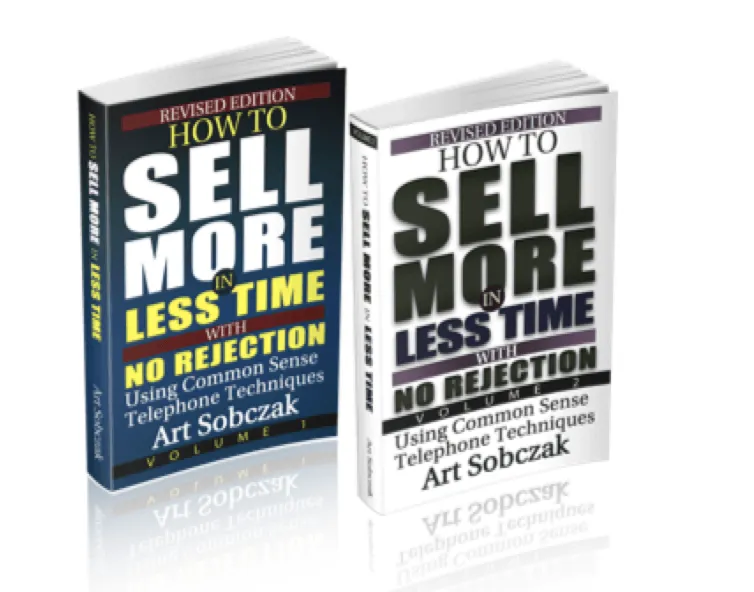How to Get Commitments and Close

by
Art Sobczak
The “close” need not—no—should not be the major point in your sales or prospecting call. Just like the long bomb is not a high percentage or highly used play in football, “closing” someone early doesn’t carry good odds either.
And just like the football team, by moving methodically downfield, getting nearer your target, you improve your chances of scoring. The closer you get, the better your odds of running a scoring play.
BUT, you do need to move the ball down field. And, you do still need to run the last scoring play, which is the ultimate close.
Therefore, as we've covered extensively with examples in their own sections in these two books, after you’ve progressed through your questioning, and while presenting the benefits ideally suited for the listener’s situation, ask questions to help move the prospect down the field. Over time these have been called many things, including “trial closes.” I like to term them “check questions,” or “first down” questions.
“Is that something that would work for you?”
“How does that sound?”
“Would that solve your problem?”
“How does that compare to what you were thinking of?”
“What are your thoughts?”
Those questions all ask for an opinion. As you gain more agreement, you should ask more action-oriented questions.
But wait a minute, you might be thinking. Don’t these questions open you up to possible negative answers?
Yep. And if you’re going to hear a problem, better to get it here while it’s still small, instead of letting the obstacle brew into a major roadblock, while later going for the all-or-nothing “close” and then hearing about the major objection.
Assuming you’re doing everything well and still hearing positive responses, then ask more action-oriented questions. Questions asking them to do something.
A “close” shouldn’t be an all-or-nothing maneuver intended to ensnare a person into buying. Instead, look at using check questions, commitment questions, and action questions to help move the prospect/customer closer to the end destination.
More Closing Ideas
Sales trainer Brian Jeffrey has some interesting ideas and suggestions about closing.
You have nothing to lose by attempting to close the sale. You don’t have the business before the attempt, and sure, you might not have it after, but at least you will have had a shot at it.
To improve your closing rate keep in mind that the person who gets the most yes’s also gets the most no’s.
Many sales people can rattle off the names of closing techniques, such as the “Alternate Choice” or the “Minor Point,” but are at a loss to recite the actual words to use in order to gain commitment. They know what to do ... they just aren’t sure how to do it. Jeffrey suggests writing down actual commitment questions on 3x5 cards, and in-between calls, glancing at them and repeating the words until they’re committed to memory. And remind yourself that you owe it to your company, your customer, and yourself to attempt a close at the appropriate times.
You need to prepare the customer for your closes. Use opinion- seeking questions such as,
“How does that sound?”
“If you were to get it, when would you want delivery?”
“How do you see yourself benefiting from ...?”
“How do you feel about this?”
“Am I going in the right direction?”, or,
“Am I talking about what you’re interested in?”
Similarly, here are more “check questions” you can use (also referred to as “tie downs” or “trial closes”). You would position these after making a statement, such as, “This would work for you, wouldn’t it?”
Try these:
“Aren’t you?
“Isn’t it?”
“Won’t they?”
“Doesn’t it?”
“Couldn’t you?”
“Am I talking about what you’re interested in?”
Positive responses here indicate you should ask for the order. Commit these trial closes to memory.
Commitment Questions You Can Use
Here are more ideas for commitment questions you can use or adapt to move the relationship forward.
“What will happen between now and our next contact?”
“If you like what you see in the sample, will you buy?”
“Are you comfortable taking this to the boss with your recommendation that you go with it?”
“So you will have those inventory figures prepared by the next time we speak, is that right?”
“You’re going to survey your staff and get their input on what features they’d like to see, and you’ll have the information by our next call, correct?”
“By when will you have had a chance to go through the material so we can speak again?”
“Is this the program that you’d personally like to invest in?”
“If you do decide to change vendors before my next call, will you call me?”
“The next time you need supplies, would you buy them from me?”
“When you send out your Request for Proposals, may I be included?”
“Shall we get started?”
“Would you like to buy it?”
“Why don’t I ship you one?”
“May I sign you up?”
“If the proposal contains all of these items, will you approve it and go with our plan?”
“Can we finalize the paperwork?”
“Do you think you would be happy with this model?”
“If we included_______, would you want to place the order today?”
“Are you thinking about getting two?” (or whatever appropriate amount is higher than what they likely will get)
(This is just one of the hundreds of tips and scripting suggestions you'll get in the two-book set of "How to Sell More, In Less Time, With NO Rejection-Using Common Sense Telephone Techniques- Volumes 1 and 2. And for just a limited time you can get them at a discount, along with a special offer.(See the special offer and order right now.)
